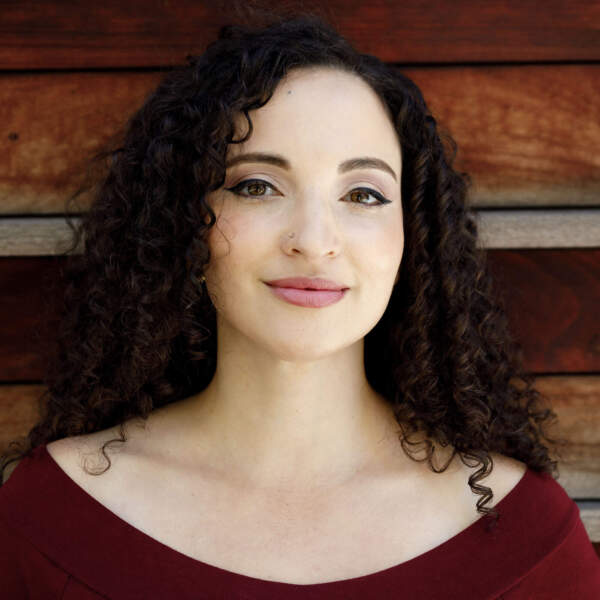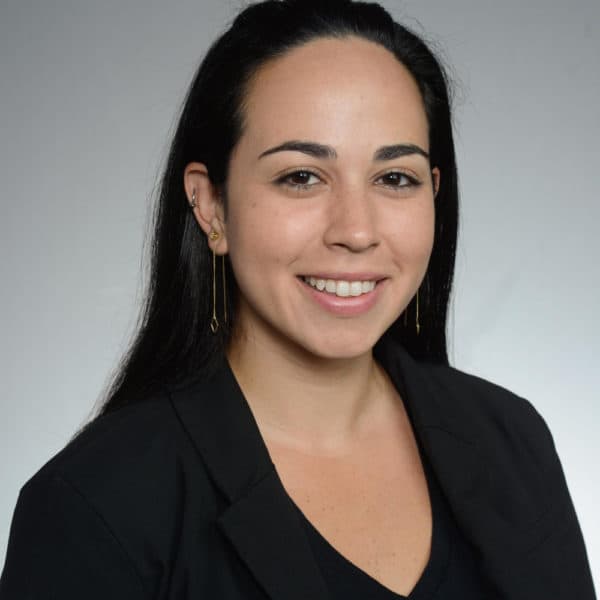Advertisement
The Only Lifeline For Hundreds Of Asylum Seekers Across The Border Is A Group Of Volunteers
Resume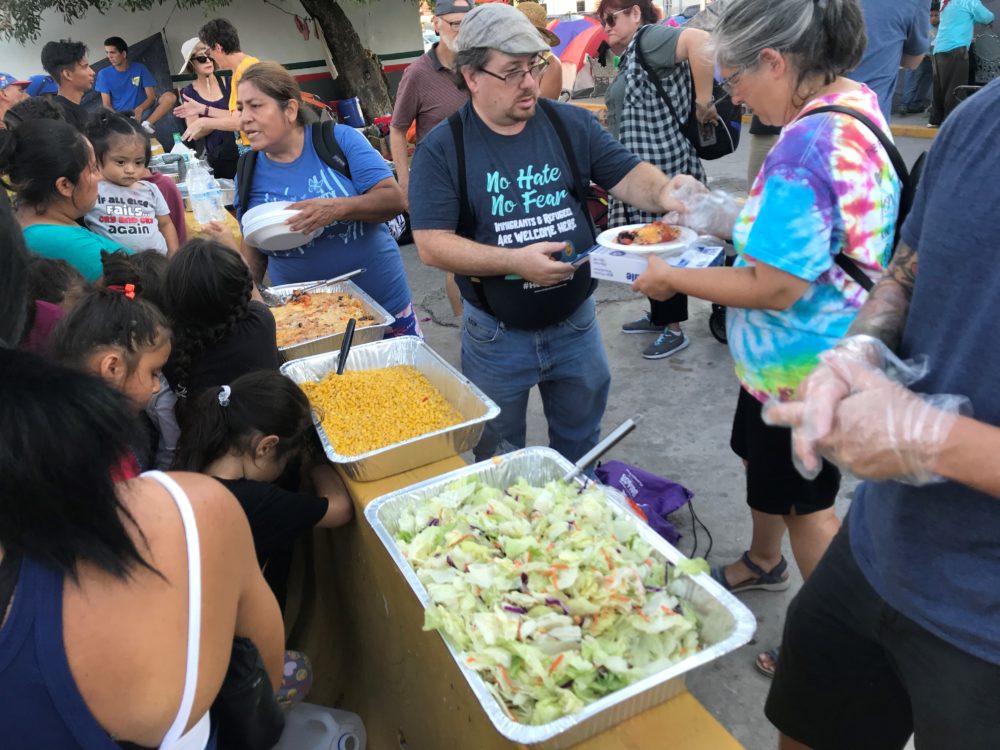
BROWNSVILLE, Texas — Mike Benavides, a 50-year-old city resident, stands dressed for the blistering summer heat with a group of seven other volunteers at La Plaza bus station.
They're getting ready to cross the border into Matamoros, Mexico — about half a mile away from where they’re standing. They’ve got wagons at their sides loaded with food, water and what they’re calling “dignity bags.” Those are plastic bags filled with soap, shampoo, deodorant and other hygiene items.
"They're things that are desperately needed," Mike says. "We've got about 500 here."
Mike is one of a handful of educators who started a volunteer network called Team Brownsville last year. They started by bringing food and water to dozens of asylum seekers waiting at the border.
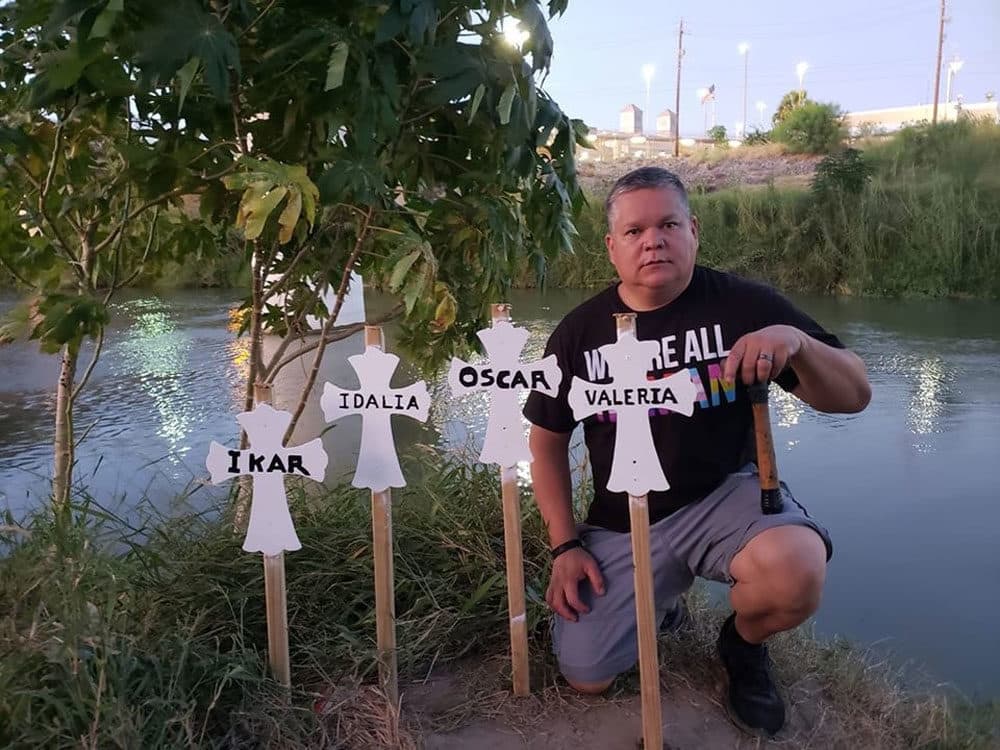
"I'd wake up before work and I'd load up a wagon with coffee and water and I'd load up another with tacos ... and I'd cross over and spend a little time there," Mike says. "Since that day, I just never stopped."
By December, Mike Benavides was crossing the border into Matamoros twice a day, seven days a week. He did this for seven months. He was also paying for food and water out of his own pocket.
“I threw my heart into this," he says. "Every penny I had. I maxed out every credit card."
Not long after, dozens of asylum-seekers turned into hundreds.
It happened after the Trump administration implemented the so-called stay in Mexico policy — or Migrant Protection Protocols — in late January. Before that, migrants who got to the border and claimed asylum could stay in the U.S. until their court hearing. Now, they have to wait in Mexico.
And, if they’re claiming asylum in the Rio Grande Valley, they’re sent to wait in Matamoros.
"We were not prepared for that," says 72-year-old volunteer Ann Finch. "I was here in July and I went across one night and we fed our normal 110, 120. The next night, we did 220. Now we’re doing almost 600."
Ann is a grandmother and full-time real estate broker who drives six hours each way from Austin to volunteer across the border about once every three weeks.
She says migrants sometimes wait for months, living in one of Mexico’s most dangerous cities — all for a chance to enter the U.S. legally. But in the last few months, the Trump administration announced new rules that would make getting asylum even more difficult.
Central Americans who cross a third country on their way to the U.S. must first apply for asylum in that country. If their claim is denied there, only then can they apply for asylum in the U.S.
That means most of the people waiting at the border, who have fled violence and poverty in their home countries and can’t go back, are essentially stranded.
The Dividing Line
Just beyond the wire mesh fence over the The Brownsville and Matamoros International Bridge, is a still and scenic Rio Grande. It's the dividing line from the U.S. into Mexico.
"This is where the people swim and drown and it looks very innocent and very calm but there’s a tremendous undertow," Ann says.
People have died trying to swim across this river. Last month, it was a mother and her 21-month-old toddler. In June, it was a father and his young daughter. As more people get tired of waiting, there’s worry that more of them will attempt the dangerous crossing.
Across The Border
We finally reach a concrete lot filled with tents. There are about 500 people here — and about half of them are women and children.
The lot's size is about a third of a football field. There are two portable bathrooms and a large dumpster in the back of the lot. Behind that dumpster is the camp’s makeshift shower: a sheet strung up as a curtain with a few jugs on the ground that people fill up with murky water from the river to wash. But many of the camp's residents go directly to the river to wash themselves and their clothes.
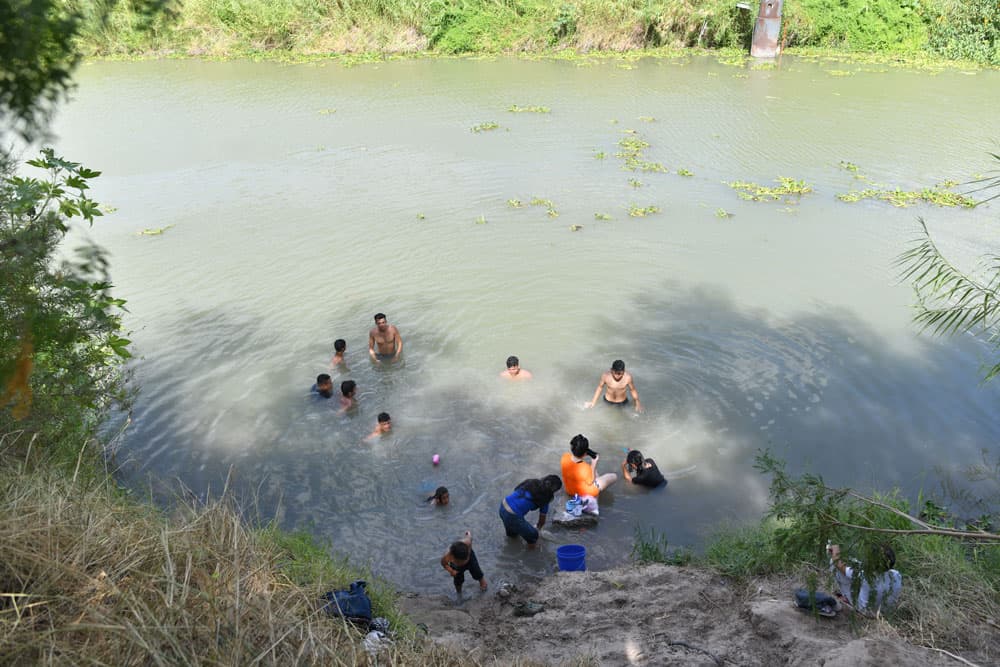
People gather quickly, anticipating the volunteers, who park their wagons and set up for breakfast.
Ann gives a nervous look. She’s already worried about running out of supplies.
"Everybody is hungry. We run out of food. They know we’re gonna run out of food so they get pretty desperate," Ann says. "We try to feed children, women and men and we try to feed children first, women first, then men. But it doesn’t work all of the time.”
The volunteers serve each person a small plate of black beans, tortillas, eggs and most importantly, a bottle of water. It’s before 10 a.m. and everyone is already sweating from the 90-degree heat.
Nearby, in the shadow of a small building, 31-year-old Angel and 21-year-old Marina and her 4-year-old son Luis take refuge from the glaring sun. They're not sharing their last names because of security concerns.
“We’re basically living out in the open," Angel says. "We’re dealing with the heat, we’re dealing with dust in the air. Everyone’s feet are damaged and our skin is sunburned.”
Angel says he spent six months traveling from Honduras and has been living in the camp for almost three weeks. He left behind his wife and five sons after receiving constant threats from gangs. He says gang members started showing up at his work, forcing him to stay home for fear of violence.
"Leaving behind my children is one of the things that has pained me the most," he says. "It’s hurt me terribly. I pray to God that he gives me the wisdom and intelligence to continue on.”
Marina came from Honduras as well, along with her son Luis. She says the journey took them three months. Luis lives with a single kidney and Marina made the dangerous journey north with the hope of having a specialist examine Luis.
“I want him to tell me that my son is alright and won’t need another operation and maybe just needs medication," Marina says. "Because the doctor in Honduras told me that if he’s not treated correctly, he may need dialysis and that’s not what I want.”
There’s no consistent medical care available at the camp. Volunteers sometimes text pictures of rashes or other symptoms to an Austin-based volunteer doctor in case he can suggest something to pick up at the local pharmacy.
Still, in the three days Marina’s been in Matamoros, she’s noticed just how essential the volunteers are to her and the others.
“Truthfully, they help us a lot. I’ve only been here three days but I can see how much they help. They’re giving us personal hygiene items and food and water. It’s good.”
'They Would Go Hungry'
The scene across the border is a grim reality of people forgotten by policymakers. The Team Brownsville volunteers are their only lifeline.
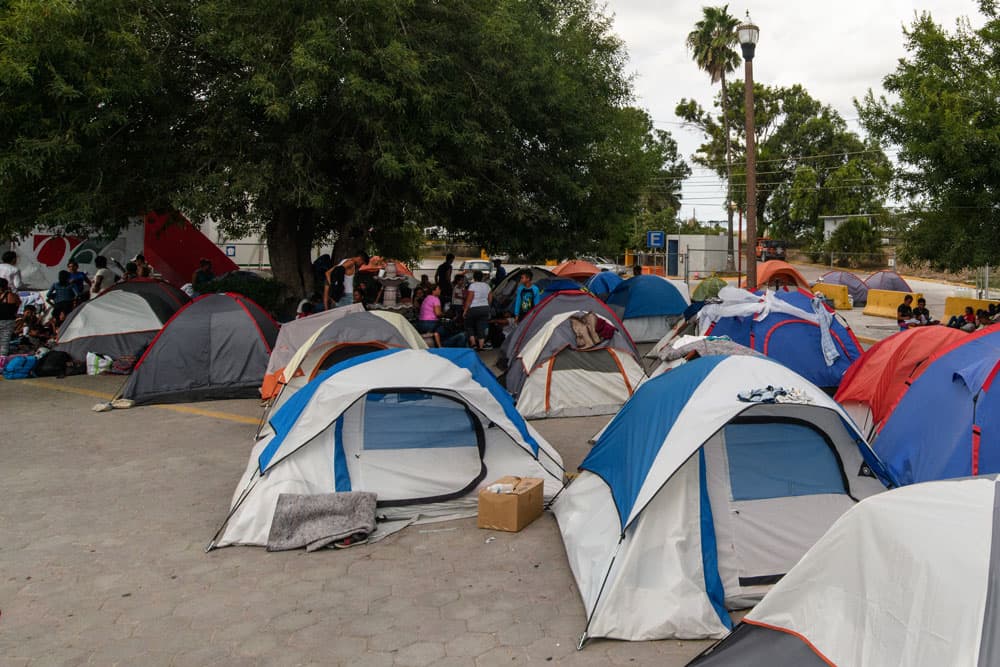
"By the time they get here, they don't have a penny in their pocket," says Team co-founder Sergio Cordova. "If we don't provide the meal, they would go hungry."
The group raises money through donations, but it’s tough. They’re not a huge operation and it costs almost $7,000 per month just to buy water.
As the heat intensifies, the volunteers pass out the remaining bottles. They won't be back with water until dinner time.
Mike is crossing twice a week now instead of 14 times, thanks to the growing number of volunteers who’ve stepped up from all over the country. They're volunteers like Elisa O’Callaghan, who lives more than 500 miles away near Dallas and who brought handmade, pillow-shaped dolls that she and her friends made to give to the children at the camp. She calls the dolls CALM.
"It spells 'Creating A Loving Memory,' she explains. "Because one day, when they're older, if they still keep something from their past, they're going [to say], 'Somebody who loved me and never met me made me this doll when I needed the most.'"
The children excitedly crowd around Elisa as she does her best to give each kid a toy.
"The only thing was going through my head was, 'I don't have enough,'" she says tearfully. "I thought I had too many and we didn't make enough. There are so many kids here now. It broke my heart."
A Final Prayer
On our final trip across the border, we watch as one of the volunteers, Father Bruce Nieli, a priest from Austin, sets up a small table as an altar to lead a Sunday night Catholic Mass.
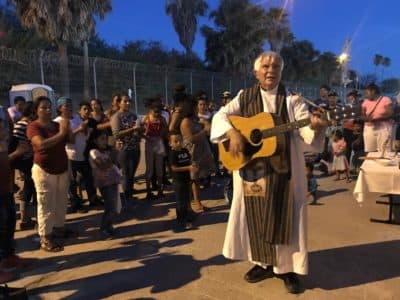
As the sun starts to set, Father Bruce brings out his guitar and as he starts strumming, more people start to join him in song and prayer.
Mike Benavides also has a prayer.
"Every time that I cross, my prayer – I say that I am crossing the bridge, I pray to God, I go, 'Please, I want to arrive and see no one there,'" he says. "I want to arrive and see that they let them in. They've all crossed. They're in America. They're being processed. They're headed home."
A home that’s safe and secure where they’re treated with dignity, not just by a group of volunteers, but by everyone. Mike knows without changes in policy, prayer isn’t enough. Still, he has to keep faith in order to continue on.
Learn more about Team Brownsville on their website or on their Facebook page.
